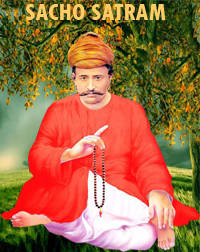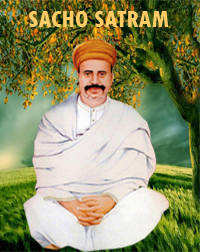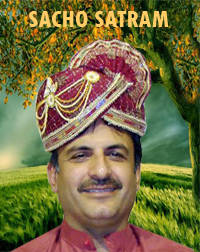It is true that we come into this world empty-handed, and when we leave, we take nothing with us. Hazir Swaroop Sai Sadhram Saheb, in one of his very inspiring and heartfelt satsangs, beautifully explained the true meaning behind this often-repeated phrase.
We often observe the material things around us , televisions, refrigerators, phones, trains, airplanes, vehicles, carpets, weapons, and countless other tangible objects. Hazir Swaroop Sai Sadhram Saheb explained that none of these things were brought into the world by anyone at birth. Instead, living beings, through their intellect and efforts, gathered natural resources and created these things.
For instance, when gold was discovered, it was shaped into jewelry like necklaces, rings, earrings, and nose rings , gaining value through craftsmanship. Medicines were not brought at birth; they were developed after experimenting with medicinal plants to cure diseases. Those who invented medicines, bulbs, refrigerators, vehicles, and many other essential items did not take these inventions with them after death, but their contributions brought immense benefits to the world. Their names were recorded, honored, and remembered across generations because their creations made human life easier, healthier, and more beautiful.
The remembrance and honor one receives after death depend on the kind of contribution they made — whether it benefited humanity or caused harm. All living beings eat, work, rest, form relationships, and eventually die. But those who, through their lives, contribute something remarkable and uplifting, continue to be remembered with respect and gratitude.
For example, we all know about Lord Ram — his parents’ names, his brothers’ names , because of his virtuous life. On the other hand, Ravan, though from the same lineage, is remembered mostly for his sinful deeds. His own brother, Kuber, lived a righteous life and was regarded as a divine being. The difference between Ravan and Kuber lay in their choices and habits. Despite both being knowledgeable, Ravan’s evil tendencies led him to be regarded as a demon, while Kuber earned respect and reverence.
Hazir Swaroop Sai Sadhram Saheb explained that whatever thoughts and intentions we focus on, we gradually become like them. If we entertain good thoughts and noble intentions, we grow into goodness. If we nurture evil thoughts, we degrade ourselves. Thus, whether people feel happy or hurt after meeting us depends on the energy we cultivate within ourselves.
All inventions that benefit humanity were made by those who came empty-handed but used their skills and intellect to create something valuable. We find raw resources everywhere, but giving them a meaningful shape creates true value — just as a plain gold biscuit becomes a precious ornament only when shaped and designed thoughtfully.
Similarly, human life becomes valuable when we shape it meaningfully — by using our talents, intellect, and energy to create, uplift, and help others, especially under the blessed guidance of our Satguru. If we simply live without making any effort to shape our lives and waste our inner resources, we fail to fulfill the true purpose of our birth.
Hazir Swaroop Sai Sadhram Saheb often emphasized that Naam, Dhyan, and Simran awaken our inner strengths, sharpen our intellect, and guide us in shaping our lives beautifully.
Taking refuge under Shahanshah Satguru Swami Sai Satramdas Saheb transforms our life. Even a sinful person can be purified, and the most hopeless life can be elevated with Saijan’s blessings. Difficulties can turn into joys, and ignorance into wisdom.
The real purpose of our human birth is not just to live and die, but to live a purposeful life. The phrase “We came empty-handed and will go empty-handed” does not mean we should sit idle, waste our talents, and neglect our duties. Instead, it reminds us that although we bring nothing with us at birth and take nothing with us at death, during the life granted to us, we must use the resources and intelligence available to us to create something valuable, make a difference, and uplift ourselves and others.
Saijan gave a beautiful example: A man complained to Shahanshah Satguru Swami Sai Satramdas saheb that though he earned from his business of farming, he could never save anything. Saijan asked whether the grain he produced was always of good quality. The man replied that sometimes the grain would spoil. Saijan then explained that just like the farmer’s earnings depend on the quality of his grains, the rewards in our life depend on the quality of our actions. Good deeds bring good returns; careless or wrong actions waste our precious life.
Thus, it is up to us:
Do we want to be remembered like Kuber or like Ravan?
Should we shine with courage like a lion, speak sweetly like a cuckoo, or waste our speech and life like a senseless dog?
We must channel our positive energies through Naam, Dhyan, Simran and shape our life meaningfully.
The true meaning of “We came empty-handed and will go empty-handed” is to enthuse us to act, create, build, serve, and progress — not to make us passive or careless. It is a call to rise, to use our intellect and efforts sincerely, to create something noble, and to set a worthy example on this karmic land (Karam Bhoomi).
Before we leave this world, we should become like Kuber, remembered for goodness, not like Ravan, remembered for evil. We should live a life that when we depart, people feel happy recalling our name, feel inspired by our deeds, and not feel sorrow or hatred.
Those who invented vehicles, airplanes, medicines, electricity, refrigeration, water facilities, hospitals, schools, musical instruments, and many such life-enriching creations came empty-handed but used their wisdom and skills to serve humanity. They left without taking anything material with them, but they earned respect, gratitude, and eternal remembrance.
Scientists, doctors, educators, engineers, inventors, and researchers all spent years in experiments, struggles, and innovations, and their contributions continue to benefit humanity today. Their work is a priceless treasure and is worthy of the highest regard.
In truth, coming empty-handed is not a weakness, but a powerful opportunity — to fill our lives with noble deeds, pure intentions, and meaningful creations. Under the grace of Shahanshah Satguru Sai Satramdas Saheb we are blessed with the guidance to transform our lives. Let us not waste this precious human birth, but instead shape it with love, wisdom, service, and devotion, so that we leave behind a legacy that inspires and uplifts many generations to come.



